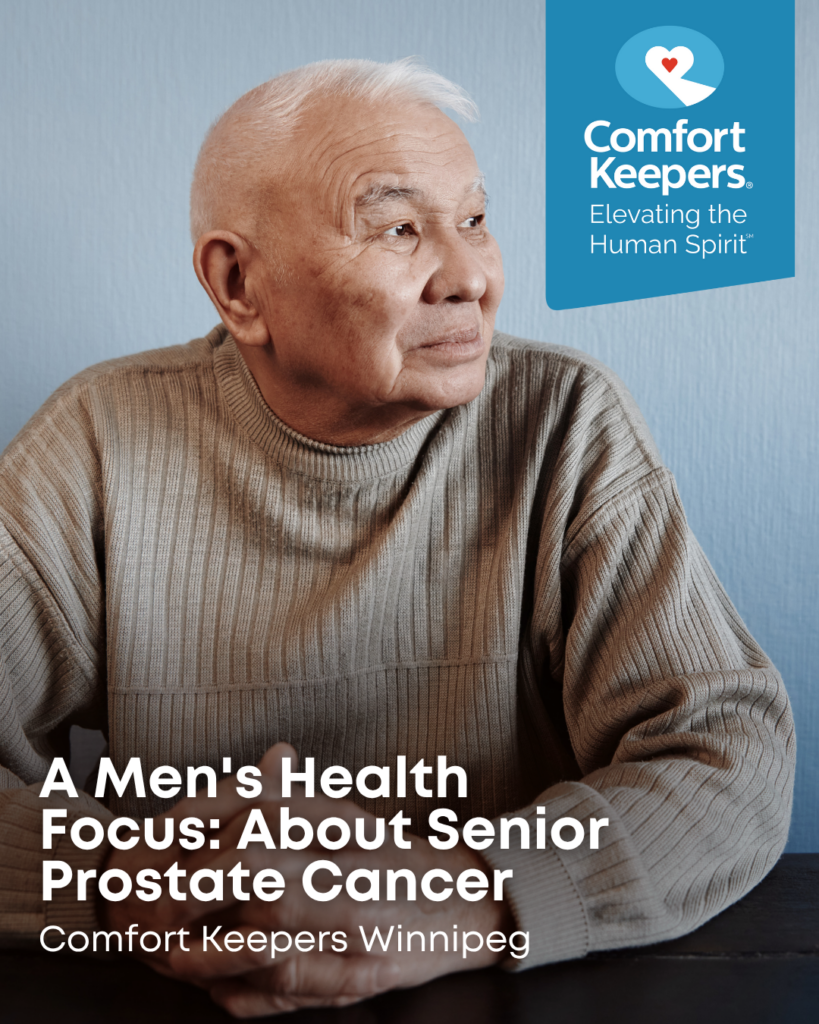A Health Focus for Winnipeg’s Men: About Senior Prostate Cancer
Winnipeg Senior Health | June 11, 2025

What Every Family Needs to Know About Prostate Cancer: Causes, Symptoms, and Treatment
The month of June acknowledges Men’s Health and its importance to every man’s well-being. According to the Canadian Cancer Society, prostate cancer is the most common cancer among Canadian men. It is the 3rd leading cause of death from cancer in men in Canada.
Men’s Health: Prostate Cancer A Growing Concern for Seniors
In 2017, the Canadian Cancer Society projected 21,600 new prostate cancer diagnoses and 4,000 related deaths. This prevalence is partly due to increased life expectancy, as 80% of cases occur in men 65 and older. Though the exact cause remains elusive, significant scientific strides have been made in understanding the genetic factors at play.
Men’s Health and Prostate Cancer: Potential Causes and Risk Factors
Researchers note that, in many instances, prostate cancer can be caused by alterations in the normal prostate cell’s DNA. Some changes are inherited genetically, passed on from one generation to the next.
As with many cancers, the genetic factor is not to be underestimated. In fact, a man is twice as likely to have prostate cancer if his brother has/had it. Those that have Lynch syndrome, a hereditary disorder caused by genetic changes, also are at higher risk.
Some of these changes, known as acquired mutations, may occur during the course of one’s life. One potential source for these acquired mutations is diet, as some studies have suggested that vitamin D deficiency may be a predictor of aggressive prostate cancer.
Exposure to certain chemicals may be another source of acquired mutations. A recent study found that U.S. veterans exposed to Agent Orange, a chemical defoliant used during the Vietnam War, had a significantly increased (48% higher) risk of development versus veterans who had not been exposed.
Symptoms of Prostate Cancer in Seniors
The risk of developing prostate cancer increases once men reach the age of 50. However, one of the more challenging aspects of prostate cancer is that symptoms often do not manifest until later stages of development, since it tends to grow slowly.
Men’s Health and the Common Symptoms of Prostate Cancer:
- Frequent urination (especially urges at night)
- Difficulty urinating
- Bladder control difficulty
- Blood in the urine and/or semen
- Swelling in the legs or pelvis
- Chronic bone pain
- Erectile dysfunction
As some men may have an “out of sight, out of mind” attitude toward medical issues, it is vital that they discuss testing with a physician as close to the age of 50 as possible – especially if they’ve experienced any of the symptoms listed above.
Screening is often done either by testing for prostate-specific antigen levels (PSA) levels in the blood, or by a digital rectal exam (DRE). If the results come back positive, the doctor may wish to test further.
Although screening can help detect prostate cancer, it does not always help gauge the severity or threat level. Additionally, test results may be false-positive (signifying that a man does have cancer when he does not), or false-negatives (signifying that he does have cancer when he does not).
Senior Cancer Treatment Options
As mentioned, doctors may not have a full understanding of how threatening a man’s prostate cancer may be – which can make it difficult to recommend treatment. Often times, these treatments – done through surgery and/or radiation – can negatively affect various aspects of normal living, especially for older men.
Many health communities tend to agree that screening (and potentially treatment) for older men may not be greatly beneficial since they are more likely to die from other conditions, should they exist.
That is not to say that prostate cancer does not pose a threat. While treatment may potentially be more harmful than the cancer itself, it’s not to be taken lightly. If your aging loved one is concerned about his prostate and unsure about screening, it’s important to begin the discussion with his doctor and to see what the best course of action is, given factors such as age and health. Screening/treatment should always be mutually agreed upon by both your loved one and his doctor.
Comfort Keepers® Can Help with Men’s Health
At Comfort Keepers® Winnipeg, our caregivers can help provide a daily routine for your loved one that promotes good health and independent living. We can also make sure that he or she has transportation to and from any scheduled appointments.
Comfort Keepers® Winnipeg Offers a Wide Range of Private Home Senior Care Services
For families concerned about the health and well-being of aging loved ones, we can help with home care services, including Alzheimer’s and dementia care, in-home personal care, respite care, specialized care, in-home nursing, end-of-life care, senior living transition services, and much more!
Comfort Keepers® professional caregivers provide services to ensure safety, health, and happiness without the stress of moving to an assisted living or rehabilitation facility. Individually tailored care plans account for living arrangements, medical issues, physical restrictions, personalities, expectations, and more.
Our Interactive Caregiving™ Approach Enables Top-Notch Homecare
Interactive Caregiving™ provides a system of care that addresses safety, nutrition, mind, body, and activities of daily living (ADLs). Our compassionate caregivers can provide a personalized home care plan for your loved one, allowing them to enjoy a healthier, safer, and more meaningful retirement at home.
Comfort Keepers® is the Most Trusted Name in Senior Care in Winnipeg
Our in-home caregivers ensure our seniors are physically, socially, and mentally engaged. In addition, we provide options, activities, events, and resources for seniors that might otherwise not be available.
Locally Owned and Operated In-Home Personal Care for Seniors
Our caregivers live and work in the Winnipeg area. We know the area and how to assist our clients using local resources. Comfort Keepers® Winnipeg is here to help you and your loved ones get the best care possible. If you live in Winnipeg and require homecare services for senior personal care and wellbeing, contact Comfort Keepers® at (204)-488-4600.
Accredited Home Care for Seniors in Winnipeg
Comfort Keepers® Winnipeg is accredited with Exemplary Standing with Accreditation Canada. Accreditation is an intensive process in which industry experts examine an organization’s processes, policies, and procedures against quality standards. To achieve accredited status, Comfort Keepers® offices met or exceeded the rigorous standards for Home Care companies, as defined by Accreditation Canada.
References:
- National Cancer Institute. “Prostate Cancer Overview.” Web. 2017.
- Cancer Treatment Centers of America. “Prostate Cancer Symptoms.” Web. 2017.
- American Cancer Society. “Early Detection.” Web. 2017.
- Medical News Today. “Prostate Cancer: Symptoms and Causes” by Christian Nordqvist. Web. 2017.
Individualized Home Care Options
Long-Term Home Care, 24 Hour Home Care & Short Term Care Options Customized for You







